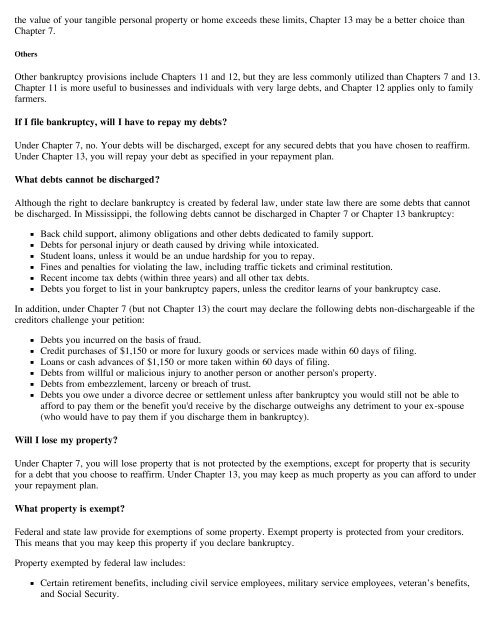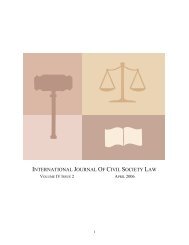Hurricane Katrina: Legal Issues - Columbus School of Law
Hurricane Katrina: Legal Issues - Columbus School of Law
Hurricane Katrina: Legal Issues - Columbus School of Law
You also want an ePaper? Increase the reach of your titles
YUMPU automatically turns print PDFs into web optimized ePapers that Google loves.
the value <strong>of</strong> your tangible personal property or home exceeds these limits, Chapter 13 may be a better choice than<br />
Chapter 7.<br />
Others<br />
Other bankruptcy provisions include Chapters 11 and 12, but they are less commonly utilized than Chapters 7 and 13.<br />
Chapter 11 is more useful to businesses and individuals with very large debts, and Chapter 12 applies only to family<br />
farmers.<br />
If I file bankruptcy, will I have to repay my debts?<br />
Under Chapter 7, no. Your debts will be discharged, except for any secured debts that you have chosen to reaffirm.<br />
Under Chapter 13, you will repay your debt as specified in your repayment plan.<br />
What debts cannot be discharged?<br />
Although the right to declare bankruptcy is created by federal law, under state law there are some debts that cannot<br />
be discharged. In Mississippi, the following debts cannot be discharged in Chapter 7 or Chapter 13 bankruptcy:<br />
Back child support, alimony obligations and other debts dedicated to family support.<br />
Debts for personal injury or death caused by driving while intoxicated.<br />
Student loans, unless it would be an undue hardship for you to repay.<br />
Fines and penalties for violating the law, including traffic tickets and criminal restitution.<br />
Recent income tax debts (within three years) and all other tax debts.<br />
Debts you forget to list in your bankruptcy papers, unless the creditor learns <strong>of</strong> your bankruptcy case.<br />
In addition, under Chapter 7 (but not Chapter 13) the court may declare the following debts non-dischargeable if the<br />
creditors challenge your petition:<br />
Debts you incurred on the basis <strong>of</strong> fraud.<br />
Credit purchases <strong>of</strong> $1,150 or more for luxury goods or services made within 60 days <strong>of</strong> filing.<br />
Loans or cash advances <strong>of</strong> $1,150 or more taken within 60 days <strong>of</strong> filing.<br />
Debts from willful or malicious injury to another person or another person's property.<br />
Debts from embezzlement, larceny or breach <strong>of</strong> trust.<br />
Debts you owe under a divorce decree or settlement unless after bankruptcy you would still not be able to<br />
afford to pay them or the benefit you'd receive by the discharge outweighs any detriment to your ex-spouse<br />
(who would have to pay them if you discharge them in bankruptcy).<br />
Will I lose my property?<br />
Under Chapter 7, you will lose property that is not protected by the exemptions, except for property that is security<br />
for a debt that you choose to reaffirm. Under Chapter 13, you may keep as much property as you can afford to under<br />
your repayment plan.<br />
What property is exempt?<br />
Federal and state law provide for exemptions <strong>of</strong> some property. Exempt property is protected from your creditors.<br />
This means that you may keep this property if you declare bankruptcy.<br />
Property exempted by federal law includes:<br />
Certain retirement benefits, including civil service employees, military service employees, veteran’s benefits,<br />
and Social Security.

















